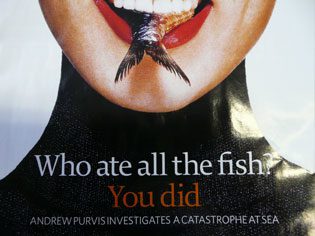News
27 April 2009
The recent spate of superficial and sensationalist stories appearing in the media has provoked the Federation into preparing a starter kit for journalists too lazy to make the effort to understand the fishing industry.
It takes the form of a list of do’s and don’ts:
Do’s
- Begin with a trite and cataclysmic headline: “Has Cod Had its Chips?” or “Who Ate All the Fish?” are good examples of the genre. A question mark is good because it avoids the need to provide evidence to support puerile assertions
- Make reference to football fields and Boeing aircraft when describing the nets used by the UK fleet. There is no need to qualify the image by indicating that only a handful of UK vessels use nets that come remotely close to this sort of description and they are exclusively employed by the pelagic industry, which these days, is generally regarded as being a model of efficiency and sustainable fishing
- Refer to Professor Calum Roberts and journalist Charles Clover as authorities in the field. There is no need to suggest that the former is regarded by most serious fisheries scientists as a zealot with a highly selective approach to the evidence advanced for his assertions.
- Generalize with abandon. The prize in the category of meaningless over-extrapolation goes to Boris Worm of Dalhousie University in Halifax, Nova Scotia, who claims that all commercial fish stocks will collapse by 2048
- It is important if possible, not to cloud the picture portrayed of unalloyed gloom, environmental irresponsibility and illegality with too many examples of cooperation between fishermen and scientists in designing effective conservation measures
- Import any number of unsupported assertions, for example: “In Europe, 50% of the cod we eat has been caught illegally”. The authorities in Iceland and Norway where most of our cod comes from (as it always has) will be surprised to hear this as their management regimes are usually held up as exemplorary
- Hold up Marine Protected Areas, not just as a means to protect biodiversity but as a panacea that will rebuild fish stocks irrespective of species and circumstances, despite the evidence that only relatively sedentary species like lobster and scallops or tropical reef fish respond in the way suggested. In examples like St Georges Bank where more mobile species like cod and haddock have been rebuilt, it is important not to confuse the reader by suggesting that a panoply of other measures have also been in place and are likely to have had at least as significant a role in rebuilding the stocks
Don’ts
- Don’t make reference to the 67% reduction in fishing effort on North Sea cod since 2001; especially don’t make reference to the scrapping schemes that have decommissioned large parts of the fishing fleets in the UK, Denmark, Belgium, Ireland which have contributed to the drastic reduction in fishing pressure
- There is really no need to refer to the rapid rebuilding of the cod stock in the North Sea, partly in response to management measures, partly due to improved recruitment
- Do not discuss the battery of cod recovery measures introduced since 1999 which include improved gear selectivity, strengthened landing controls, closed areas, days at sea restrictions, highly restrictive quotas, and designated ports
- Only refer to the fisheries science partnerships where fishermen and scientists work collaboratively to improve the quality of fish stock assessments if it can be done in a way that suggests these initiatives corrupt the independence and impartiality of the scientists
- Certainly do not suggest that an element in the decline in cod stocks in community waters in the late 1990s may be in part related to a “regime shift” linked to changes in the availability of certain types of plankton at critical stages in the life cycle. Better to concentrate on greedy, short-sighted and irresponsible fishermen.
- Don’t mention the number of vessels in the UK fleet that have signed up for the Seafish Responsible Fishing Scheme
- Ignore fishing industry initiatives such as the Trevose seasonal closure, cod avoidance plans, industry led real-time closures, square mesh panels, benthos release panels, and a hundred other examples where the industry has made real progress towards conservation objectives
- Ignore the Regional Advisory Councils where the fishing industry works along with scientists, environmentalists, and other stakeholders to provide the European Commission and member states with coherent, evidence-based advice on how to improve what is recognised as a highly complex but over-centralised and unwieldy management regime
- Above all make no reference to the fact that fishing is an arduous occupation, pursued in a demanding physical environment where fishermen strive to make a livelihood, within a sub-optimal management regime in need of reform
Hopefully this checklist will provide a useful basis for any number of articles by lazy journalists who can’t be bothered to investigate the realities of the fishing industry. The other kind of journalists are welcome to call the NFFO on 0044 0 (1)904 635430

